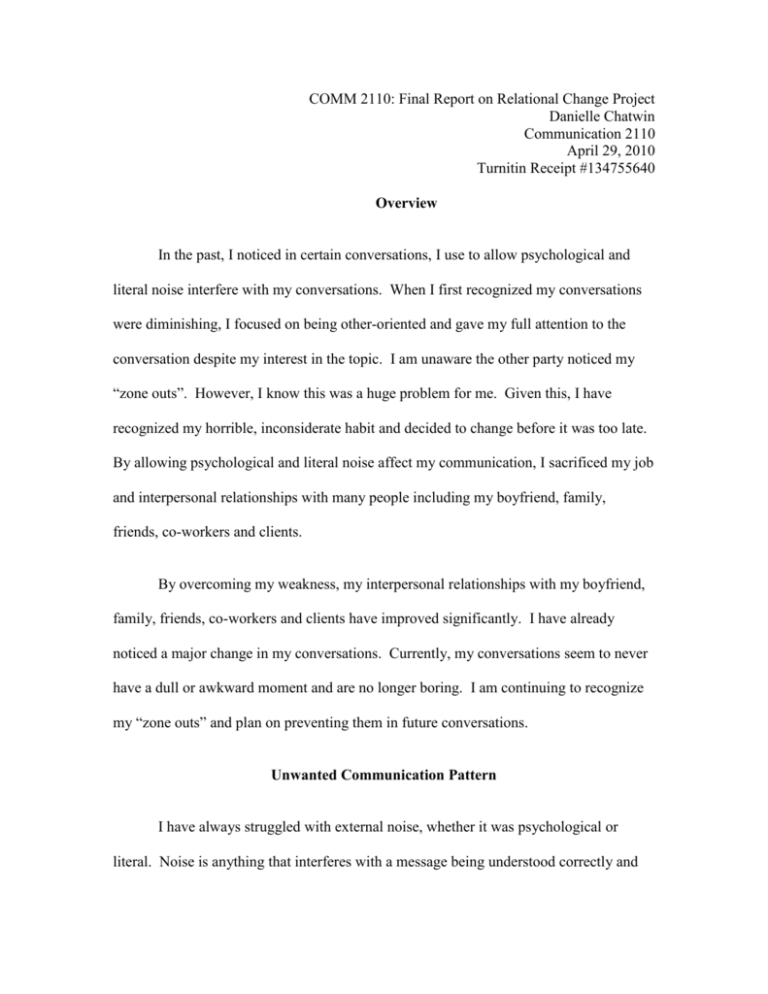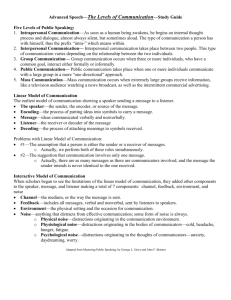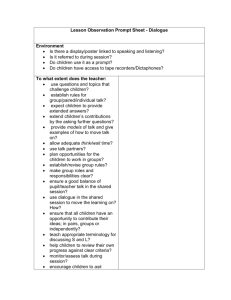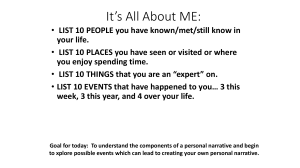COMM 2110: Final Report on Relational Change Project
advertisement

COMM 2110: Final Report on Relational Change Project Danielle Chatwin Communication 2110 April 29, 2010 Turnitin Receipt #134755640 Overview In the past, I noticed in certain conversations, I use to allow psychological and literal noise interfere with my conversations. When I first recognized my conversations were diminishing, I focused on being other-oriented and gave my full attention to the conversation despite my interest in the topic. I am unaware the other party noticed my “zone outs”. However, I know this was a huge problem for me. Given this, I have recognized my horrible, inconsiderate habit and decided to change before it was too late. By allowing psychological and literal noise affect my communication, I sacrificed my job and interpersonal relationships with many people including my boyfriend, family, friends, co-workers and clients. By overcoming my weakness, my interpersonal relationships with my boyfriend, family, friends, co-workers and clients have improved significantly. I have already noticed a major change in my conversations. Currently, my conversations seem to never have a dull or awkward moment and are no longer boring. I am continuing to recognize my “zone outs” and plan on preventing them in future conversations. Unwanted Communication Pattern I have always struggled with external noise, whether it was psychological or literal. Noise is anything that interferes with a message being understood correctly and being successfully transferred to the receiver. Noise will always be present and it is my duty to prevent noise from affecting my daily conversations. The first step in correcting any issue is acknowledging the problem. Second step is implementing a plan to change and prevent it from occurring in the future. A prime example was when I was participating in a meeting with a client and listening to the client explaining her story. Approximately an hour and a half into the conversation, I started to pay attention to a conversation my co-workers were having in the hallway. Once I noticed I was completely lost in the conversation, I caught, corrected myself and returned to the conversation with the client. If I was unable to catch myself in time, I would have been unable to relay the information to the attorney efficiently and could have threatened my job. Another example was with my boyfriend and me and his obsession with discussing politics. Occasionally, I find some of the “breaking news” stories interesting. If the media is not reporting breaking news and they are just reporting day to day politics, I would rather be watching and discussing something else. When he wants to express his feelings about a topic showing on Fox News, he gives me the entire background of the topic. I use to wish he would tell me why he is so passionate about the topic, get to point and move on. I am not educated in politics and I feel uncomfortable listening and discussing anything related to politics. I realized I was dealing with a case of listener apprehension. Listener apprehension is feeling nervous or apprehensive about listening or speaking to others and being able to adjust psychologically to messages. Consequently, I hurt his feelings and he stopped speaking with me about everything because of my past reactions. Once I recognized how rude I was being, I decided to become more of a content-oriented listener. Being a content-oriented listener means being comfortable with complex detailed information. I informed him that when there was a topic he would like to discuss, he needed to understand I wouldn’t be able to debate it with him, nor will I be able to understand it completely. But I promised I would listen and ask him questions to help myself understand the topic better. To date, my strategy has worked and I will continue to try to rid myself of listener apprehension and improve my content-orientated listening skills. Strategies 1. My first strategy was to improve my listening skills by becoming more of a content-oriented listener, rather than action-oriented listener. An action-oriented listener doesn’t like the speaker to tell lengthy stories; they want the speaker to get to the point. When action-oriented listeners (like myself) get overwhelmed with complex and detailed information, we start loosing focus on the topic because we are afraid the message will be misinterpreted and second guess if the information is accurate. 2. My second strategy was not to allow external noise, both literal and psychological, interrupt my listening skills. As I mentioned before, noise is always present and it is out responsibility to ignore it. By ignoring noise, the messages I am trying to receive will be relayed correctly. Communicating accurate messages involves minimizing both external and psychological noise. 3. My third strategy was to try to paraphrase more often. The only way to know if you understand the message being transferred to you is to check your understanding by paraphrasing. Paraphrasing is being able to understand another person’s message if repeating the summarized events, details or key points of what was understood to be said. Therefore, there is no miscommunication of what is being said. I have used my new paraphrasing skills at my law office and it has worked wonders. I noticed I am doing tasks more accurately and efficiently and the attorney has more confidence I will complete the task correctly. For example, the attorney said I told me he needed a phone conference with Robert for Thursday at noon. I repeated back to him “Okay, you wanted me set up a phone conference between you and Robert on Thursday at noon?” He said “No, I meant Tuesday at noon.” Sometimes attorneys have so many dates and times on their minds that it is the assistant’s job to make sure everything is calendared correctly and verify the information with the attorney. If I did not paraphrase the assigned task I would have scheduled the phone conference incorrectly and would have been in a ton of trouble. Constraints I found it very difficult to concentrate on non-interesting topics. I only wanted to hear what I wanted to hear, also known as selective attention. Selective attention is the process of focusing on specific stimuli; we selectively lock on to some things in our environment and ignore others. For example, I was never interested in hearing my boyfriend and his discussion of politics, I was more interested in listening to the conversation my co-workers were having rather than a client’s story. Implementation During my progression to ignoring noise, I kept a daily calendar of every time I failed or overcame one of my strategies. I wrote down the three (3) following questions: What was the situation?; What skill did I use or not use correctly?; What can I do differently? I was able to focus on my weaker communication skills by targeting certain situations that needed additional work. I motivated myself by using my communication weaknesses as my target behavior. My reinforcer was treating myself to weekly pedicures. I told myself, if I was able to acknowledge and correct my communication weakness, I was going to treat myself to a pedicure weekly. However, if I was not able to acknowledge and correct my communication issues, then my reinforcer contingency will eliminate pedicures all together. It wasn’t always simple to identify the beginning symptoms, but at least I tried to notice them and correct them immediately. For example, a while back, I was having a conversation with an attorney who wanted to refer our firm a divorce case as a personal favor. However, our firm does not do divorces. I was listening to him explain the situation and I was trying to take notes and ask pertinent questions, but I didn’t know what questions to ask. I was dealing with a case of listener apprehension. I tried to do the best I could and took detailed notes so I can research our conversation later. I was frustrated that I was not able to understand the conversation. I should have explained to the attorney that I am unfamiliar with family law and I believe he would have explained the case a bit differently. Results I never realized I had so many communication issues. I wondered if others may have noticed my communication skills were lacking but never told me. After taking this class and learning how important communication is in our everyday life. I finally acknowledge that I needed to change my negative communication habits. Especially when working with other attorneys, clients and co-workers. I should be able to communicate efficiently without allowing noise and listener apprehension interfere with my conversations. I experienced several positive consequences during my trial and error. For example, I struggled with admitting I had a communication problem. Once I admitted the problem, I was proud of myself. It felt great knowing I needed to work on an issue and accomplishing it. There were not always positive consequences; I came across many negative ones too. I had a difficult time keeping track of each communication situation. I would get frustrated each time it happened and I just wanted to be able to fix it overnight. My plans worked because I wouldn’t give up, I pressed on and used my positive reinforcer to encourage me and eventually I was able to overcome my negative communication habits. Recommendations My future plans are to continue ignoring noise and feel more confident with detailed and complex information. I know changing communication skills will be a work in progress and there will always be something to improve on. I will continue to strive and perfect my communication skills in an effort to succeed in my career, improve my relationship with my boyfriend and feel more confident in speaking with clients. I will continue my present course of action because of the successful results. I feel if I continue my plan without any modifications, I will only perfect my communication skills even more. Works Cited (Beebe, Human Communication as Action: Message Transfer, Noise, p. 9) (Beebe, Listening Barriers, Listener Apprehension, p. 136) (Beebe, Listening Styles, Content-Oriented Listeners, p. 129) (Beebe, Listening Styles, Action-Oriented Listener, p. 129) (Beebe, Human Communication as Action: Message Transfer, p. 8) (Beebe, Reflect Content by Paraphrasing) (Beebe, Understanding Interpersonal Perception, Selecting, Selective Attention, p. 69)





